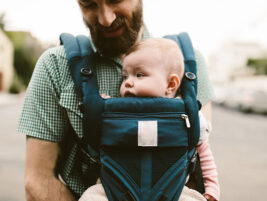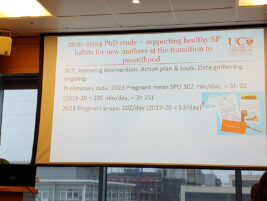Antenatal and paediatric health care services are available to everyone in Sweden. They are free-of-charge and have high credibility among families as evidenced by the fact that almost 100 % of women who are pregnant or parenting register and participate. A specialized unit within our antenatal care service is designed to accept referrals of women with addiction problems of alcohol, narcotics and drug abuse. The name of the unit is Team Haga, a cross- disciplinary service for specialized care for substance-abusing pregnant women and their babies in Gothenburg. The goals of the program are to protect the fetus from substance-abuse effects, to support women to stop using during pregnancy and to stay substancefree after delivery. During pregnancy, women see midwives weekly and also have visits to the gynaecologist. After delivery the child health care provider at the unit has contact with the infants and families during the first six months. An important part of the health service is targeted parent support.
Established in 2007, Team Haga has practitioners who are competent in maternal health, child health care, psychosocial work and psychiatric care. Two peadiatric nurses and one peadiatrican working cooperatively, form the team; a great part of the work consists of home visits. The primary goals of the home visiting service includes:
- following the infant´s health and development
- providing parental support
- promoting good and loving relationship between parents and infants so that the children get the developmental support they need
- attending to the infant´s needs, noticing them so that the parents notice and respond appropriately
- encouraging mentalization, supporting parents to become aware of and understand the infant´s feelings and expressions
The women who are referred have many challenges especially because they are living in highly vulnerable social situations and may have a mental illness that becomes more evident when they are substance-free. Pregnancy and early parenthood often provide motivation to make a major life change. However, most of the women referred need a lot of support in continuing to be substancefree and to develop good parenting (Nordenfors & Höljer, 2012).
The big challenge that Team Haga and families face is how the goals can be achieved. First, the work must start with assuring that a positive relationship develops between the nurse specialist and parents. Experience shows that the relationship is important, influencing how the parents and nurse can develop a deeper, therapeutic relationship and allowing the specialist to understand and respond to each parent’s unique life circumstances (Kurtz, Landy, Jack, Wahoush, Sheehan & Macmillan, 2012). The parents referred, most often women, usually have their own significant needs and struggle to meet their own emotional needs and those of their young children. As is common with many presenting as anxious or depressed, they have an insecure attachment profile. They find it difficult to understand how their own mental illness can affect their own needs and those of the children. William, Domain, Bagett, Mitchell & Larsson (2010) saw in an evaluation that private netting and mental illness are factors that influence abilities to receive a home visiting program.
What do Team Haga pediatric nurses and pediatricians do? We support parents to confidently bathe, feed and care for their children. We talk about how infants and young children express their needs and respond to parents’ many questions. Instructions in baby massage complement these services. We work with the parents to support their children’s developmental progress by offering a development assessment according to ASQ (Age & Stage Questionnaires) at four months of age and one follow up at about one years old. We listen and provide advice about how parents can support the development of their children.
We also talk about how to secure the home when the infant starts moving. Infants who have been treated for neonatal abstinence syndrome (Jansson & Velez, 2012) need extra support from their parents. These babies can have problems with their regulation (sleeping, feeding, and crying), muscle tone and motor activity. Weight and other remaining health checks are also performed at home.
Note: Child health care; medical supervision, parent groups and vaccinations are given at the clinic setting.
Antenatal and paediatric home visits are important and most rewarding. However, home visiting services in Sweden are still somewhat unique. There is, however, the experience of a first-time home visit that is offered by the child health care services (Jansson, 2002). Of additional interest, the USA has long had the experience of home visiting programs led by nurses, among others, Nurse- Family Partnership (NFP). NFP studies have demonstrated that in the long run there are personal gains and economic benefits to the community with home visiting services to women during pregnancy and in the first years of a baby’s life (Olds et al., 2010).
Team Hega plans to do an evaluation of our home visiting program and provide a follow-up especially looking at developmental (social, emotional, relational and cognitive) for the children. We are starting a study to monitor how the children’s life situations, health status and development look after they have left the unit. This is an important step for us in order to further develop the healthcare services for women during pregnancy, their children and their families.
References
Jansson, A. (2002). First-time mothers` satisfaction with early encounters with the nurse in child healthcare: home visits or visits to the clinic? Acta Paediatrica. 91, 182-190.
Jansson. L.M. & Velez, M. (2012). Neonatal abstinence syndrome. Current Opinion in Pediatrics, 24 (2), 252-258.
Kurtz Landy, C., Jack, S., Wahoush, O., Sheehan, D & Mcmillan, H. (2012). Mothers experience in the Nurse-Family Partnership program: a qualitative case study. Medical Center Nursing, 11 (15), 1-12.
Nordenfors,M., & Höljer, I. (2012). Kvinnors erfarenhet av stöd från Mödrabarnhälsovårdsteamet i Haga. (FOU i Väst/ GR). Göteborg.
Olds, D., Kitzman, H., Cole, R., Hanks, C., Arcoleo, K., Luckey, D., Knudtson, M., Henderson, C., Bondy, J & Stevenson, A. (2010). Enduring Effects of Prenatal and Infancy Home Visiting by Nurses on Maternal Life Course and Government Spending. Archives of Pediatrics & Adolescent Medicine ,164 (5), 119-129.
William Domain, E., Baggett, K,. Carta, J,. Mitchell, S. & Larsson, E. (2010). Factors influencing mothers abilities to engage in a comprehensive parenting intervention program. Public health Nursing, 27 (5), 399-407.
Home Visiting: Antenatal and Paediatric Health Care Services in Sweden
Authors
Lilja, Maria,
Gothenburg, Sweden,
maria.e.lilja@vgregion.se








